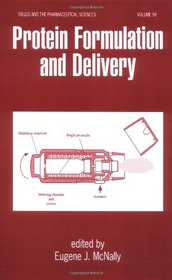Search -
Protein Formulation and Delivery (Drugs and the Pharmaceutical Sciences)
Protein Formulation and Delivery - Drugs and the Pharmaceutical Sciences
Author:
This handy reference provides insight into the approach used to identify the stability profile of a molecule that comes at the end of the drug registration process, and supplies an in-depth review of the mechanisms and associated causes of protein instability likely to be encountered during drug formulation development. Emphasizes the importanc... more »
Author:
This handy reference provides insight into the approach used to identify the stability profile of a molecule that comes at the end of the drug registration process, and supplies an in-depth review of the mechanisms and associated causes of protein instability likely to be encountered during drug formulation development. Emphasizes the importanc... more »
ISBN-13: 9780824778835
ISBN-10: 0824778839
Publication Date: 9/21/1999
Pages: 278
Edition: 1
Rating: ?
ISBN-10: 0824778839
Publication Date: 9/21/1999
Pages: 278
Edition: 1
Rating: ?
0 stars, based on 0 rating
Genres:
- Science & Math >> Biological Sciences
- Medicine >> Pharmacology >> General
- Medicine >> Pharmacology >> Pharmacy
- Medicine >> General
- Medical Books >> Pharmacology >> General
- Medical Books >> Pharmacology >> Pharmacy
- Medical Books >> Pharmacology >> Drug Delivery Systems




